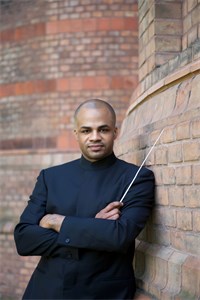US conductor accuses classical music of ‘implicit bias’
mainThe conductor Brandon Keith Brown, who lost his job at Brown University two years ago after student complaints of harshness, has published an extensive article accusing every corner of classical music of prejudice against minorities.
He argues:
Each season, administrators, musicians, and artist managers exclude Black conductors from subscription concerts. Perhaps they believe racial equity will increase competition, decrease their control, opportunities, and power, and compromise white superiority. In any case, audiences learn we’re inferior.…
Musicians may work their whole lives without experiencing Black conductors, and never realize a sense of loss. Musicians learn we lack competence, and our musicianship has no value.
Bias through suspicion, and doubt accompany guest engagements. We’re regarded as disposable tokens, hired at the grace of White administrations, not because we earned it. Musicians sometimes disrespect us with impunity.
Behavior includes:
Physical assault
Cursing
Not playing when cued or at all
Talking back/arguing
Refusing correction
Overly disgruntle/uncooperative behavior
Lack of attention and focus
Vocal hostility (i.e. yelling)
Disseriousness
Changing parts at the concert to cause confusion
Not showing up to rehearsals on time or at all.

Read on here.






How does one know that there is “implicit bias”? Is it the sort of bias for which there is no evidence?
This man is having a mental breakdown. I hope he is able to obtain help.He is blaming everything and everyone because he has no career or engagements. Maybe you simply are not a good conductor and/or person (judging by your past history of being let go from institutions), Mr. Brown. There are incredible black musicians who work with top level orchestras. Wayne Marshall is one example. However, he is a fine conductor and one of the best organists alive. He has made it on merit.
Mr. Brown is a highly talented and trained conductor. He studied with many of the greats of our time and is also a caring person. Also what he says does have truth to it.
His conducting and musical skills are indeed great, unlike his social skills!
It will still take a long time before people are capable to understand that a cultural tradition is distinct from ethnicity, also where that form has been born from ethnical circumstances.
Well, no, classical music is most definitely rooted in European cultural traditions, and one has to learn them and absorb them completely to fully participate in them. Just as Japanese dancers who want to learn Flamenco, have to transform themselves and become a Flamenco persona. Just as Martha Graham would transform herself to dance a role. Americans long took European journeys to acculturate themselves, and losing that is a tragedy. But now, even Europeans have lost connection with their traditions.
“accusing every corner of classical music of prejudice against minorities”-this guy reminds me of the marching military man who was the only one in step on the parade ground!
There is no doubt that there is bias, implicit or explicit, in classical music. Mr. Brown is right about that.
Unfortunately, he is among the worst advocates for this cause, as he is universally considered a deeply unpleasant person to play for and is impossible to work with. Brown is shockingly rude, unwilling to listen to advice or criticism, and regards himself as a conducting giant, when he is no more or less talented than any other young conductor currently out there. His arrogance is simply breathtaking.
I realize that he will see this criticism as an example of bias due to race, and there is simply nothing I or anyone else can do about that except to say that it is categorically false.
James DePriest, Leslie Dunner, Roderick Cox, and John McLaughlin Williams are(or were in the case of DePriest) wonderful conductors who advanced the cause of both music as a whole and that of black conductors. Mr. Brown is not in their league, musically or as a person.
There’s also Bobby McFerrin, who was very popular during his tenure with the St. Paul Chamber Orchestra.
With the greatest respect, may I offer the correct spelling of “DePreist”. James DePreist was a wonderful conductor, and one of the dearest persons I’ve ever known. (I had the honor of producing several of his recordings back in the 90s.)
My apologies!
In 1974 I was playing with the Memphis Symphony and Maestro DePreist was the guest conductor for a two-concert weekend.
I missed the first (Friday)performance due to the sudden death of my father. When I arrived at the concert hall on Saturday night the personnel manager told me that Maestro DePriest wanted to speak with me.
I went to his dressing room and he conveyed his absolutely genuine & sincere condolences at my loss. I could not have been more impressed.
What the program was is lost to time, but I distinctly remember that under his baton that orchestra had never played better.
Truly a great person.
Also the late Calvin Simmons and the very much alive Michael Morgan of the Oakland (California) Symphony. Mr. Morgan has been their conductor since 1986. Mr. Simmons tragic early death was greatly mourned.
Simmons left behind several highly prized recordings as well. Carpenter’s “Krazy Kat” ballet comes to mind.
I played for Michael Morgan in the 80’s and thought he was good too.
1) Oh, there’s nothing “implicit” about the bias in classical music, it’s quite open and explicit.
2) You lost me with your list of grievances:
– “Physical assault … Not playing when cued or at all”
One is a crime, the other is bad musicianship, they hardly belong on the same list.
– “Talking back/arguing”
Ha, have you ever seen the youtube videos of rehearsals of the Berlin Philharmonic with Abbado, or LSO with Bernstein, or Kleiber with the Bavarians? You’d think that any of those first chairs who sassed back at these maestros were the music directors
– “Disseriousness”
Seriously, is that a word?
It all has to be positive — even Karajan operated that way. BKB doesn’t seem to know this.
My view from a distance: why would anyone seek to engage one who speaks in such caustic generalities? All his article does is accuse, point fingers and judge others – exactly the sort of actions against which he is railing. He offers no solutions and nothing constructive. He only espouses bitterness and anger. If screeds such as this are the manner he plans to affect change I fear he is not going to be successful. He is just further alienating himself. His personal racism is far from implicit; it is highly explicit.
At the risk of being considered “disserious,” this is a load of claptrap. My racial antennae are usually pretty well tuned, but I see here someone who is having a tough time and, not quite literately (learn to make a simple plural, please, and a possessive) is ranting.
What is someone running an orchestra supposed to do with this? “Black conductors are alone in an industry that refuses to learn our cultural repertoire.” Please be specific. To what repertoire in particular do you refer?
What does this mean? “Limiting Black artists to one at a time is racist.” Concerts usually only have one conductor at a time. One guest soloist. Get real: rightly or wrongly, there are far fewer black conductors around than white ones, though there are increasing numbers of black solo performers. We certainly see plenty in Canada, many of them Canadian, and that is from a country with a less significant black demographic than the US. He talks about “tokenism,” but tokenism is an attitude, not a number. Like it or not, black conductors will be infiltrated into the mainstream one at a time, and relatively few until more emerge from that community.
And he knows this: he identifies the problem. “There’re [sic] no powerful international Black conductor advocates. We rely on august white mentors who don’t share our cultural narrative.
When no one shares your cultural narrative, finding relatable mentors can be a challenge.”
That seems to me to be the first challenge, and one that can only be addressed inside the black community.
The racist white community has not hesitated to embrace Asian artists, who are drawn from a huge catchment group. They are now fostered in North America, the apparent target of all this hostility, but the leaders emerged on the scene fully-formed by their own cultures — people like Seiji Ozawa. Black musicians may need to do a bit more of their own legwork until they form a power base populated by their own mentors and agents and administrators.
If half of what he alleges in his list is true — things like physical violence and cursing — there surely is recourse. Some of the other complaints have been endured by many white conductors, too, and I would imagine many of them would be women. Some beg the question as to whether the man (or woman) on the podium is showing the chops musicians expect when a new conductor shows up. He may meet bad attitude, but he would very much seem to come equipped with it too.
“We rely on august white mentors who don’t share our cultural narrative.”
What cultural narrative is needed to learn when to begin and how to manage the speeding up towards the end of the first movement of Dvorak 7
may be a bit of Czech narrative indeed!
“There’re no powerful international Black conductor advocates. We rely on august white mentors who don’t share our cultural narrative. When no one shares your cultural narrative, finding relatable mentors can be a challenge.”
There is no ‘black cultural narrative’ that has any relationship with conducting, which is about what you hear and not about what you see.
Also, talking about ‘ethnic communities’ is group think, reducing an individual to a representative of a group, instead of seeing someone as an individual human being.
Ironically, where white racism creates barriers, it is forgotten that the original appearance of the human form is a black African. ALL other human appearances are derivatives and adaptations.
I have to admit that behind Asian artists there is big money and huge lobby. If the western classical music industry won’t them welcome so this huge Asian market will be unwelcome too. Who want to lost engagements, contracts, records etc? Right answer – nobody.
This conductor fails to see what’s right in front of him: there are many qualified African American musicians and musicians of color who are able to get and hold down jobs in the field based on merit. That he is apparently unable to share in this success speaks more about him than anyone else.
Unfortunately, in the US these days, when a person of color doesn’t get his/her way, the first reaction is to scream “racist” knowing leftists will agree without thinking or bothering to check the facts.
Not just the USA, believe me…
Please Mr.Brown, come back to debate us in the comments! I’ll be right back, let me just get my popcorn…
Come on, Mr B – you’ve done pretty well in your career but you’ve reached a ceiling you’ll probably never push through. Just suck it up and don’t blame it on others……
We had a long back and forth with him back in May.
https://slippedisc.com/2019/05/us-conductor-charges-university-with-racial-discrimination/
“We’re regarded as disposable tokens, hired at the grace of White administrations, not because we earned it. Musicians sometimes disrespect us with impunity.”
Part of the problem is affirmative action. It makes people think that people got their jobs just because of skin color and not on merit. Clarence Thomas has written that affirmative action amounts to racial discrimination and is every bit as wrong as segregation or slavery.
https://www.businessinsider.com/how-clarence-thomas-grew-to-hate-affirmative-action-2013-10
You lost me at Clarence Thomas.
Why? Is it your view that because he may be horrible in some respects, then he can never say anything true?
How Manichaean you are!
I’d forgotten about this exchange. I just read the whole thing.
This guy goes looking for trouble. He sees racism in every interaction with a white person. And nothing is ever his fault. His arrogance is breathtaking, and his illogicality is massive. And when people cannot construct a proper sentence, you can question their ability to construct a proper argument.
The kind of behaviour attributed to him would NOT be tolerated in a white person in this day and age. I have no doubt he could make some racist attitude out of that, but when it comes to the inability to criticise anyone BECAUSE of their race, you have the absurdity of affirmative action in a nutshell.
But I guess I am “inedibly racist.”
This kind of abuse of the ‘race card’ is hampering actual progress on the issue.
Unfortunately some people use the race card instead of examining their own conduct. I don’t know whether it applies to this case but I have known it happen more times than it should.
Is it possible Mr. Brown is a bit ‘overly disgruntle’?
My goodness,there’s a lot of bitterness and anger here.
He may well have a valid point, invisible to many or most of us. I do think there is considerable, but often quite subtle, racism in all the arts including (but not especially) in music, and in my experience, often among the most obviously (and self-trumpeting) “liberal,” and is revealed incidentally and inadvertently, most typically in over-praise. One problem is that it displays itself in two related but contradictory ways: opportunities given to the unworthy for reasons of guilt or real or imagined quota-filling, and opportunities denied or sharply limited to the worthy for a variety of reasons, but sometimes because a guilt quota is regarded as already having been filled so now they can move on.
So do not dismiss this guy’s beef out of hand.
However … there is little excuse for any conductor to be rude to any orchestra; there is no excuse for a conductor to be rude to a student or amateur orchestra, even if it is being obtuse or deliberately difficult, because as a rule both the students/amateurs and their “maestro” are at that level for a reason. The students/amateurs know it. They are under no illusions. The maestros? Well …. they seethe because that damned Berlin Philharmonic is just too stupid to call.
I have witnessed some excellent soloists and conductors deal with non-professional orchestras, and it seemed the better and more successful the musician, the quicker they were to instinctively size up the situation and aim for and achieve the best results possible. And it’s not due to any lack of ego on their part. Oddly, it was the lesser musicians who had the greater difficulty adjusting to the realities of the situation.
Positive action only helps those who could not get the job on their own merits. It is a disgrace.
If I lose my job at a music school… It is because I am black.
If I don’t get the engagements I want with orchestras… It is because I am black.
If the musicians of an orchestra don’t like me… It is because I am black.
If musicians complaint about my quality as a conductor… It is because I am black.
Stop complaining and accept that perhaps you are not as good as you think you are (something very common among conductors anyway).
No mention from him about: James DePreist; Raymond Harvey; Harvey Felder; Michael Morgan; Joseph Young (new M.D., Berkeley Symphony.)
Fact is…the classical music industry moves very slowly about EVERYTHING. Now that there are so many women conductors out there, we’re naturally seeing more of them achieve wonderful success. Same for Hispanic conductors. I predict that the same will happen for African-American conductors but, most likely, slowly, just like these other groups advanced very slowly.
I don’t know much about the Brown University Orchestra, but this is what I found on the school’s web site:
Participation in the Brown University Orchestra is open to all members of the Brown community: undergraduate and graduate students, faculty, and staff. Members of the RISD community are also eligible to participate. Musicians from the local community are welcome to audition and may be invited to join if openings exist.
It’s most likely a good ensemble, but it probably isn’t on the same level as an elite university orchestra (Juilliard, Eastman, Indiana, Michigan, Oberlin, etc.). Any conductor working with an orchestra like Brown’s has to understand that fact. I don’t know much about Brandon Keith Brown, but if he acted like a jerk, he deserved to go.
If might be all right to act like you’re the second coming of George Szell if you’re working with a major professional orchestra (although some may correctly disagree with that point!), but it’s never acceptable if you’re leading a university/college level or community group.
He is conducting a group who just want to have fun playing in their own time. They aren’t actually studying music, and have no intention to become professional musicians. Being aggressive or rude means no-one will show up for rehearsals.
He really got it wrong. There is a very explicit bias: most American orchestral organizations would bend backwards to hire competent Black conductors when they have a chance.
So how do you know this? Can you name specific orchestras that “would” bend over backwards? You write as if you are so sure that if there were “competent” black conductors that American orchestras would go out of there way to hire the person. How are you able to write such a generalized and assured comment?
My opinion is based on my long experience in American orchestral life.
So you are essentially saying that no competent black conductors exist. Since so few American orchestras actually engage black conductors. Looking at the season brochures of the largest 25 orchestras one could make that assumption based on what you say
For those things to happen, the orchestra would really have to hold the conductor in contempt. So, he needs a Black conductor to tell him that completely alienating an orchestra is a problem?
I’m very sorry he feels this way, whether true or not, but his rhetoric is what makes him impossible to hire, not his race. I have spoken about him with many colleagues (mostly of color), and they agree that his attitude makes him a nonstarter.
Ok. Can we talk about the issues that he is presenting? I know for some it may be hard, but just for a second, let’s ignore the messenger, but not the message.
In this case, regardless of the messenger, the message itself has not an iota of truth in it.
In this case the message is so obviously baseless and wrong that it does not deserve much of a discussion.
Apologies for saying essentially the same thing more than once: it looked to me like my first response did not go through.
He’s still conflating a number of issues, but this comment:
Musicians sometimes disrespect us with impunity.
Is spot on. However, I’ve seen it a million times towards ‘white’ conductors; I don’t believe it’s necessarily a colour issue.
This guys sounds like a real treat. Bye bye.
What does the race/gender of a conductor have to do with the quality of the art?! Nothing!
I’m surprised the name of the very successful conductor Henry Lewis hasn’t popped up. It might also be instructive to look up the Wikipedia biography for Alton Adams.
I have a certain sympathy for Mr. Brown and his aspirations, but perhaps the ‘community’ orchestra at Brown was not the basket in which he should have put all his eggs.